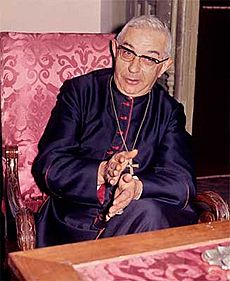Vicente Enrique y Tarancón facts for kids
Quick facts for kids His Eminence Vicente Enrique y Tarancón |
|
|---|---|
| Cardinal, Archbishop of Madrid | |
 |
|
| Church | Roman Catholic |
| Archdiocese | Madrid |
| In Office | 1971–1983 |
| Predecessor | Casimiro Morcillo González |
| Successor | Ángel Suquía Goicoechea |
| Other posts | Cardinal-Priest of San Giovanni Crisostomo a Monte Sacro Alto |
| Orders | |
| Ordination | 1 November 1929 |
| Consecration | 24 March 1946 |
| Created Cardinal | 28 April 1969 |
| Rank | Cardinal-Priest |
| Personal details | |
| Born | 14 May 1907 Burriana, Spain |
| Died | 28 November 1994 (aged 87) Valencia, Spain |
| Buried | San Isidro Church, Madrid |
| Nationality | Spanish |
| Previous post | Bishop of Solsona (1945–1964) Archbishop of Oviedo (1964–1969) Archbishop of Toledo (1969–1971) |
| Coat of arms |  |
| Styles of Vicente Enrique y Tarancón |
|
|---|---|
 |
|
| Reference style | His Eminence |
| Spoken style | Your Eminence |
| Informal style | Cardinal |
| See | Madrid (emeritus) |
Vicente Enrique y Tarancón (born May 14, 1907 – died November 28, 1994) was an important Spanish Cardinal in the Roman Catholic Church. In Spain, people often called him Cardenal Tarancón or just Tarancón. He served as the Archbishop of Madrid from 1971 to 1983. He was also the head of the Spanish group of bishops, called the Spanish Episcopal Conference, from 1971 to 1981. This was a very important time in Spain, known as the Spanish transition to democracy, when the country moved from a dictatorship to a democracy. He became a Cardinal in 1969.
Early Life and Church Career
Vicente Enrique y Tarancón was born in Burriana, Spain. His parents were Manuel Enrique Urios and Vicenta Tarancón Fandos. He had an older brother, Manuel, and a younger sister, Vicenta.
He started his studies at Colegio de la Consolación in Burriana. Later, he went to special schools for priests, called seminaries, in Tortosa and Valencia. On November 1, 1929, he became a priest in Tortosa. He then worked in churches in the Diocese of Tortosa until 1933. From 1933 to 1938, he worked with a Catholic group called Catholic Action in the Diocese of Madrid. After that, he went back to working in churches in Tortosa.
Becoming a Bishop and Archbishop
On November 25, 1945, Pope Pius XII chose Enrique y Tarancón to be the Bishop of Solsona. He officially became a bishop on March 24, 1946.
In February 1953, he became the secretary of the Spanish Episcopal Conference, which is a group of all the bishops in Spain. He also took part in the Second Vatican Council from 1962 to 1965. This was a very important meeting of Catholic leaders from all over the world.
Later, he became the Archbishop of Oviedo on April 12, 1964. Then, on January 30, 1969, he became the Archbishop of Toledo. As the Archbishop of Toledo, he was also known as the Primate of Spain, which is a very high position in the Spanish Catholic Church.
Becoming a Cardinal and Leader in Madrid
Pope Paul VI made him a Cardinal Priest on April 28, 1969. This meant he became one of the Pope's closest advisors. His special church in Rome was called S. Giovanni Crisostomo a Monte Sacro Alto.
After the Archbishop of Madrid passed away, Cardinal Tarancón was put in charge of the Madrid-Alcalá area starting May 30, 1971. On December 3, he was officially named the Archbishop of Madrid. In the same year, he also became the President of the Spanish Episcopal Conference. He was formally elected to this role in February 1972.
Role in Spanish Transition to Democracy
As Archbishop of Madrid and head of the Spanish bishops, Cardinal Tarancón played a very important role during the last years of the Francoist State (the time when Francisco Franco ruled Spain). The relationship between the government and the Church was difficult during this period.
Cardinal Tarancón was a close supporter of Pope Paul VI. Because of his views, some extreme right-wing groups who supported Franco saw him as an enemy. At the funeral of Prime Minister Luis Carrero Blanco in 1973, some people even shouted "Tarancón al paredón" (meaning "Tarancón to the firing squad"). This showed how much some people disagreed with his ideas.
Just one week after Franco died, on November 27, 1975, Cardinal Tarancón gave a famous speech (called a homily) to King Juan Carlos I. This speech took place at the old church of Los Jerónimos. In his speech, the Cardinal asked the King to be "the king of all Spaniards, and not only of part of them." This was a call for unity and democracy in Spain.
During the first years of the Spanish Transition, Cardinal Tarancón was known for being open to discussion with all different groups in society and politics. He helped guide the Church through this big change in Spain.
Later Life and Death
Cardinal Tarancón was one of the cardinals who helped choose the new Pope in 1978. He took part in the meetings (called conclaves) that selected Pope John Paul I in August and Pope John Paul II in October.
He stepped down as Archbishop of Madrid on April 12, 1983. Cardinal Tarancón passed away in Valencia at the age of 87. He is buried in the Collegiate of San Isidro in Madrid.
See also
 In Spanish: Vicente Enrique y Tarancón para niños
In Spanish: Vicente Enrique y Tarancón para niños

